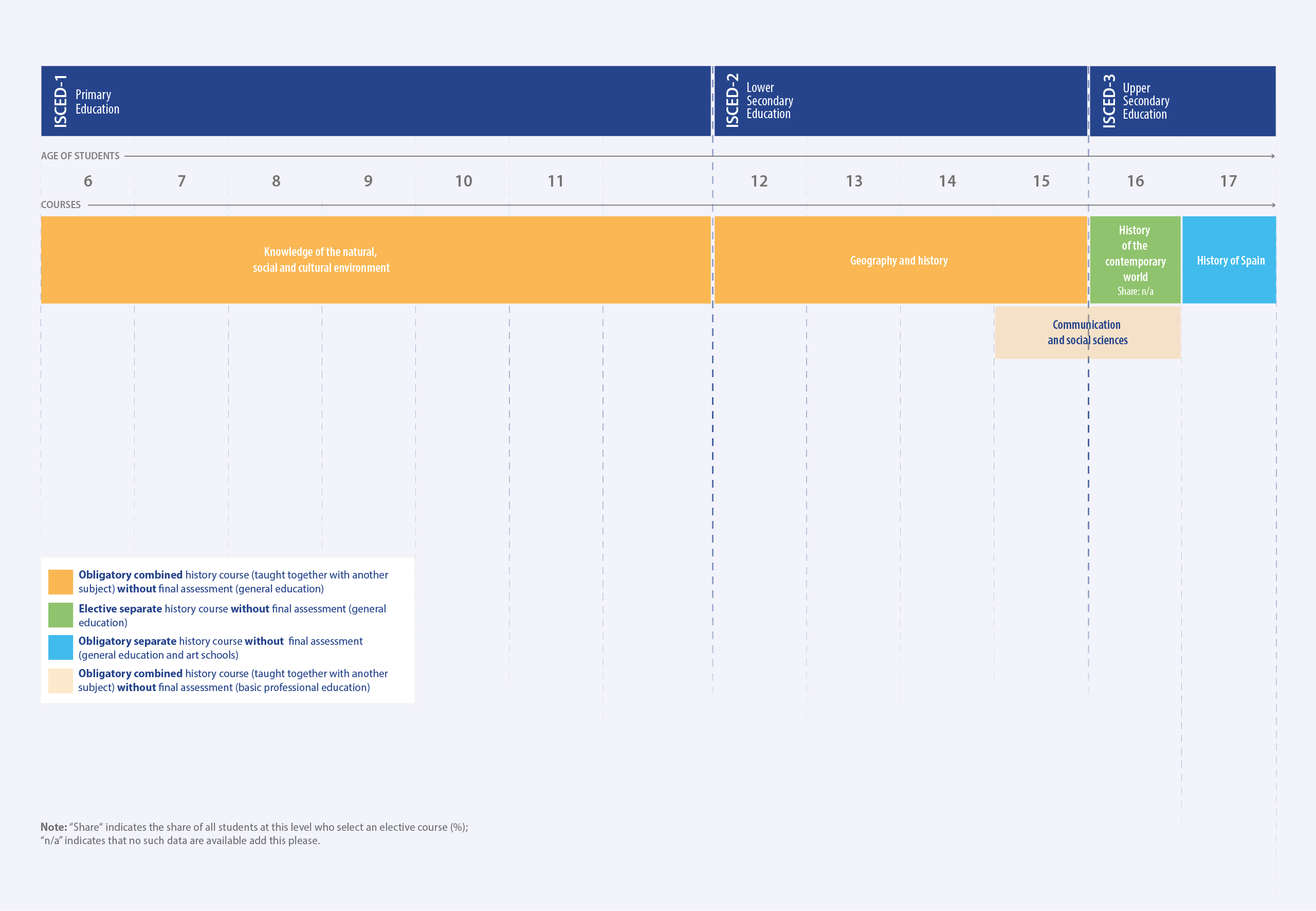
OVERVIEW
In Spain, history is part of a compulsory multidisciplinary course throughout primary education, throughout lower secondary education, and for two years during basic professional education. In upper secondary education, one elective standalone history course is offered during the first year, while another standalone history course is compulsory for all students during the second, final year. There are no end-of-stage exams for history courses in Spain.
The history curriculum is organised thematically. It is developed by the state as well as the education authorities of the autonomous communities. Education authorities report that both civil society organisations and minority groups participate in this process. All private and semi-private schools follow the same history curricula as public schools, with additional languages other than Spanish used as languages of instruction in the various autonomous communities.
Assessment methods include oral presentations/exams, knowledge-based questions, source-based questions and multiple-choice questions. Schools select resources to use in their teaching, with the education authorities of the respective autonomous communities being responsible for the supervision of textbooks and other curricular materials. All history teachers must hold a bachelor’s degree or equivalent qualification: for the primary level, this must be a primary education teacher’s degree; for the secondary level, candidates must undergo additional postgraduate pedagogical training. In-service professional development programmes are optional.
Download high-resolution schematic
FURTHER INSIGHTS

HISTORY IN SCHOOL
History is taught throughout all six years of primary education (ages 6-11) as part of a compulsory multidisciplinary course, “Knowledge of the natural, social and cultural environment”. Similarly, the course “Geography and history” is compulsory throughout all four years of lower secondary education (ages 12-15). In the penultimate year of upper secondary education (age 16), the course “History of the contemporary world” is elective; in the final year (age 17), the course “History of Spain” is compulsory for all students. In basic professional education, history is also taught as part of the compulsory multidisciplinary course “Communication and social sciences” for two years (ages 15-16).
There are private schools and semi-private schools (publicly funded schools owned by private entities); all follow the same curricula as the public system, except for the schools that follow non-national educational systems. Some private schools are religiously affiliated but, regardless of this affiliation, they follow the curricula of the public education system. In the autonomous communities, history can be taught in Spanish and/or the language of that community (Aranese in Catalonia, Basque in the Basque Country and Navarre, Catalan in Catalonia and the Balearic Islands, Galician in Galicia, and Valencian in the Valencian Community).

HISTORY CURRICULUM
The Spanish Government, through the Ministry of Education and Vocational Training, is responsible for the design and establishment of the basic aims, framework and content of history curricula. In accordance with these guidelines, the education authorities (departments of education) of the various autonomous communities define and finalise the curricula for their respective regions. The authorities report that both civil society organisations and minority groups participate in curriculum development.
|
AIMS REPRESENTED “VERY WELL” OR “QUITE WELL” IN THE CURRICULUM |
PERIODS |
GEOGRAPHICAL SCOPE |
APPROACHES |
|
|
|
|
The authorities report that minority groups (cultural, ethnic, linguistic, national, religious or sexual/gender) are included in the history curriculum.
Curricula workstation by GEI (History curricula search by country)

ASSESSMENT AND EXAMS
The assessment methods teachers are required to use are oral presentations/exams, knowledge-based questions, source-based questions and multiple-choice questions.
There are no end-of-stage history exams in Spain.

TEXTBOOKS AND OTHER RESOURCES
Educational resources are not licensed by the national government, and schools select the materials to use in their teaching. The supervision of textbooks and other curricular materials is the responsibility of the education authorities of each autonomous community as a part of the ordinary inspection process carried out for all elements related to the teaching and learning process.
Policies on the use of different types of educational resources are as follows:
|
|
International TextbookCat (GEI collection of Textbooks and Educational Media)

HISTORY TEACHERS AND THEIR EDUCATION
All prospective primary school teachers are required to hold a primary education teacher’s degree granted by a university and typically acquired over four academic years. Prospective secondary or vocational education teachers must undergo specialised pedagogical training at the postgraduate level, in addition to holding a bachelor’s degree or an equivalent qualification. The didactic specialisation or master’s degree is usually completed in one academic year.
At the primary level, teachers receive general training to teach across a range of disciplines. At the secondary level, teachers are trained exclusively or primarily as history teachers.
In-service professional development courses are optional. The Ministry of Education and Vocational Training and the departments for education of the autonomous communities are responsible for the design, development and delivery of these courses. The Ministry of Education and Vocational Training offers continuing professional development programmes through the National Institute of Educational Technologies and Teacher Training (INTEF), in conjunction with other institutions as appropriate. Some of these courses focus on the use of new technologies in education and on new teaching methodologies.
Spanish Association of History and Geography Teachers (presentation by EuroClio)
Spanish Association of History and Geography Teachers (official website)
The information in the sections above is an excerpt of the thematic and general data presented in the following OHTE publications:
2022: Pandemics and natural disasters as reflected in history teaching
2023: OHTE General Report on the State of History Teaching in Europe



